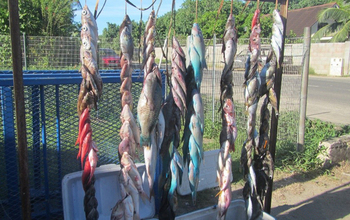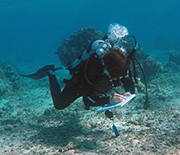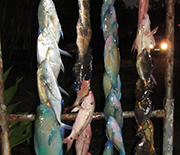Research News
When coral reefs change, researchers and local fishing communities see different results
Groups perceive environmental disruptions in varying ways

Researchers analyzed the composition of fish caught near the island of Moorea in French Polynesia.
March 7, 2019
Find related stories on NSF's Environmental Research and Education (ERE) programs at this link; find related stories on NSF's Long-Term Ecological Research Program at this link.
Results of a new study looking at coral reef disturbances, fish abundance and coastal fishers' catches suggest that ecologists and community anglers may perceive environmental disruptions in very different ways.
The apparent disconnect between data-driven scientists and experience-driven fishing communities has implications for the management and resilience of coral reefs and other sensitive marine ecosystems.
Lead study author Andrew Rassweiler of Florida State University (FSU), who worked with collaborators at the University of California, Santa Barbara (UCSB) and San Diego State University to conduct fishing surveys and fish population assessments on the French Polynesian island of Moorea, said the research "shows that different groups have different perceptions of change and ecosystem health."
The findings are published this week in the journal Ambio.
Ecological Distress
Coral reefs around the world experience pressure from human activities. As ecosystems react to declines in biodiversity, tropical coastal fishers -- whose livelihoods often depend on coral reefs -- become less economically and culturally secure.
In Moorea, some parts of the island's lagoons support thriving coral communities, while other areas are giving way to overgrowth by seaweed.
An outbreak of coral-devouring crown-of-thorns sea stars in 2009 and a destructive cyclone in 2010 reduced live coral cover by some 95 percent in many locations.
These events threw the ecosystem into disarray, scientists say. In addition to widespread coral losses, effects included abrupt changes in fish populations, with algae-eating, herbivorous fish swarming the area to graze on seaweed growing on the skeletons of dead coral.
This influx of seaweed-eating fish wasn't necessarily a surprise, the researchers maintain.
Studies at the National Science Foundation's (NSF) Moorea Coral Reef Long-Term Ecological Research (LTER) site on the island had identified the role of herbivorous fish in keeping seaweed forests in check.
But Moorea's local fishing communities, where more than three quarters of households have a member who actively fishes the reef, knew less about how this rapid shift in fish abundance occurred.
"Everyone around the island is fishing, but we know very little about how fishers decide where to fish and what fish to target," Rassweiler said. "This research was a first step in looking at how fishing behavior changed following a big change in the fish community itself."
Russ Schmitt, a marine ecologist at UCSB and principal investigator of the NSF Moorea Coral Reef LTER site, added "It turned out that the fishers in Moorea barely noticed the massive ecological shift and reported they didn't change their fishing practices, yet the composition of fish in their catches changed dramatically."
Local Perceptions
By comparing fish caught and sold to fish observed on the reef, the team determined that the shifting catches did in fact reflect shifting abundances of reef-dwelling fish.
Notably, Naso, or unicornfish, which islanders ate multiple times per week, decreased, and algae-eating parrotfish increased, appearing in higher concentrations after the mass coral die-off.
Fishers prized both unicornfish and parrotfish before the ecological disturbances. But the local fishers didn't perceive the changes in their concentrations as significant.
Surveys conducted by the team indicated that while residents of the island were aware of shifts, the disturbances did not prompt a change in fishing behavior and, puzzlingly for researchers, did not result in reported changes in the composition of fish caught, sold and eaten.
"Fish consumers can have very different perceptions than scientists and resource managers, even in a place like Moorea where locals are closely connected to reefs," said Dan Thornhill, a program director in the National Science Foundation's (NSF) Division of Ocean Sciences, which funded the study along with NSF's Dynamics of Coupled Natural and Human Systems program. The latter is part of NSF's Environmental Research and Education (ERE) portfolio.
Noting the different perceptions "is an important consideration going forward in the sustainable management of reefs and the fisheries they support," Thornhill said.
Added study co-author and UCSB marine ecologist Sally Holbrook, "Moorea's fishers view the environment as naturally variable, and changes in abundances of fish on the reef are normal occurrences for them."
Scientific Perspective
The changes concerned the scientists. Seemingly small changes in population abundances could be portents of deeper ecological dysfunction, they said.
"We demonstrated that these shifts are ecologically important," Rassweiler said. "This is part of a bigger project in which we're working with fishers to think about reef health and management. It's been enlightening because they have unique insights into the status of different species."
San Diego State University anthropologist Matthew Lauer added, "It's fascinating that marine scientists and Polynesian fishers, both of whom spend a huge amount of time on these reefs, have such radically different views about ecosystem change.
"Getting a handle on their views about marine health will help us learn more about these reefs, and contribute to more effective and collaborative resource management."
FSU researcher Sarah Lester also contributed to the study, as well as UCSB scientists Katrina Munsterman, Hunter Lenihan and Andrew Brooks; and Laboratoire d'Excellence CORAIL scientists Rakamaly Madi Moussa and Joachim Claudet.
Along with NSF, this study was supported by the Gordon and Betty Moore Foundation and the Agence Nationale de la Recherche.
-- Cheryl Dybas, NSF (703) 292-7734 cdybas@nsf.gov-- Zachary Boehm, FSU (850) 645-1504 zboehm@fsu.edu
-
Scientists looked at fish abundance on the reef in comparison to fish species sold on the island.
Credit and Larger Version -
The marine biologists used sizing cards to determine the sizes of fish that were caught and sold.
Credit and Larger Version -
Understanding which fish were offered at markets was important to the study.
Credit and Larger Version -
The researchers charted courses around the island to survey which fish were at roadside stands.
Credit and Larger Version -
The team worked to understand how fishing behavior changed in response to changes on the reef.
Credit and Larger Version
Related Programs
Biological Oceanography
Long-Term Ecological Research
CNH2: Dynamics of Integrated Socio-Environmental Systems










修改评论